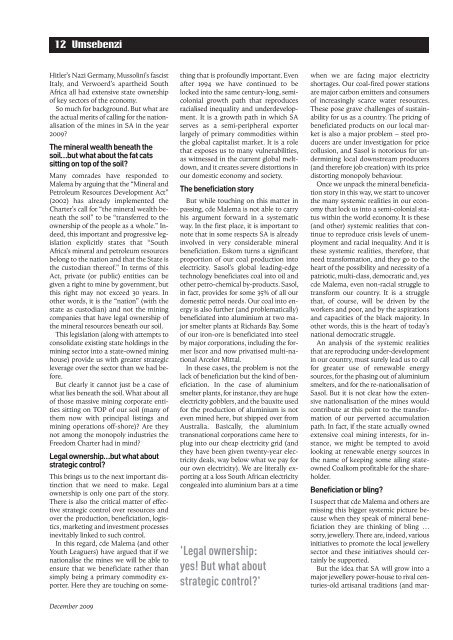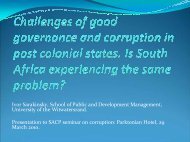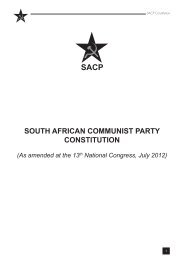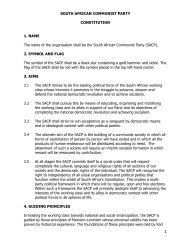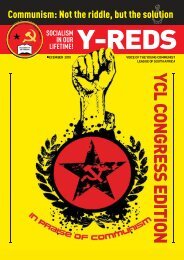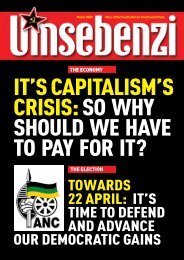Forward to Socialism!! - South African Communist Party
Forward to Socialism!! - South African Communist Party
Forward to Socialism!! - South African Communist Party
You also want an ePaper? Increase the reach of your titles
YUMPU automatically turns print PDFs into web optimized ePapers that Google loves.
12 Umsebenzi<br />
Hitler’s Nazi Germany, Mussolini’s fascist<br />
Italy, and Verwoerd’s apartheid <strong>South</strong><br />
Africa all had extensive state ownership<br />
of key sec<strong>to</strong>rs of the economy.<br />
So much for background. But what are<br />
the actual merits of calling for the nationalisation<br />
of the mines in SA in the year<br />
2009?<br />
The mineral wealth beneath the<br />
soil…but what about the fat cats<br />
sitting on <strong>to</strong>p of the soil?<br />
Many comrades have responded <strong>to</strong><br />
Malema by arguing that the “Mineral and<br />
Petroleum Resources Development Act”<br />
(2002) has already implemented the<br />
Charter’s call for “the mineral wealth beneath<br />
the soil” <strong>to</strong> be “transferred <strong>to</strong> the<br />
ownership of the people as a whole.” Indeed,<br />
this important and progressive legislation<br />
explicitly states that “<strong>South</strong><br />
Africa’s mineral and petroleum resources<br />
belong <strong>to</strong> the nation and that the State is<br />
the cus<strong>to</strong>dian thereof.” In terms of this<br />
Act, private (or public) entities can be<br />
given a right <strong>to</strong> mine by government, but<br />
this right may not exceed 30 years. In<br />
other words, it is the “nation” (with the<br />
state as cus<strong>to</strong>dian) and not the mining<br />
companies that have legal ownership of<br />
the mineral resources beneath our soil.<br />
This legislation (along with attempts <strong>to</strong><br />
consolidate existing state holdings in the<br />
mining sec<strong>to</strong>r in<strong>to</strong> a state-owned mining<br />
house) provide us with greater strategic<br />
leverage over the sec<strong>to</strong>r than we had before.<br />
But clearly it cannot just be a case of<br />
what lies beneath the soil. What about all<br />
of those massive mining corporate entities<br />
sitting on TOP of our soil (many of<br />
them now with principal listings and<br />
mining operations off-shore)? Are they<br />
not among the monopoly industries the<br />
Freedom Charter had in mind?<br />
Beneficiation or bling?<br />
I suspect that cde Malema and others are<br />
missing this bigger systemic picture because<br />
when they speak of mineral beneficiation<br />
they are thinking of bling …<br />
sorry, jewellery. There are, indeed, various<br />
initiatives <strong>to</strong> promote the local jewellery<br />
sec<strong>to</strong>r and these initiatives should certainly<br />
be supported.<br />
But the idea that SA will grow in<strong>to</strong> a<br />
major jewellery power-house <strong>to</strong> rival centuries-old<br />
artisanal traditions (and marthing<br />
that is profoundly important. Even<br />
after 1994 we have continued <strong>to</strong> be<br />
locked in<strong>to</strong> the same century-long, semicolonial<br />
growth path that reproduces<br />
racialised inequality and underdevelopment.<br />
It is a growth path in which SA<br />
serves as a semi-peripheral exporter<br />
largely of primary commodities within<br />
the global capitalist market. It is a role<br />
that exposes us <strong>to</strong> many vulnerabilities,<br />
as witnessed in the current global meltdown,<br />
and it creates severe dis<strong>to</strong>rtions in<br />
our domestic economy and society.<br />
The beneficiation s<strong>to</strong>ry<br />
But while <strong>to</strong>uching on this matter in<br />
passing, cde Malema is not able <strong>to</strong> carry<br />
his argument forward in a systematic<br />
way. In the first place, it is important <strong>to</strong><br />
note that in some respects SA is already<br />
involved in very considerable mineral<br />
beneficiation. Eskom turns a significant<br />
proportion of our coal production in<strong>to</strong><br />
electricity. Sasol’s global leading-edge<br />
technology beneficiates coal in<strong>to</strong> oil and<br />
other petro-chemical by-products. Sasol,<br />
in fact, provides for some 35% of all our<br />
domestic petrol needs. Our coal in<strong>to</strong> energy<br />
is also further (and problematically)<br />
beneficiated in<strong>to</strong> aluminium at two major<br />
smelter plants at Richards Bay. Some<br />
of our iron-ore is beneficiated in<strong>to</strong> steel<br />
by major corporations, including the former<br />
Iscor and now privatised multi-national<br />
Arcelor Mittal.<br />
In these cases, the problem is not the<br />
lack of beneficiation but the kind of beneficiation.<br />
In the case of aluminium<br />
smelter plants, for instance, they are huge<br />
electricity gobblers, and the bauxite used<br />
for the production of aluminium is not<br />
even mined here, but shipped over from<br />
Australia. Basically, the aluminium<br />
transnational corporations came here <strong>to</strong><br />
plug in<strong>to</strong> our cheap electricity grid (and<br />
they have been given twenty-year electricity<br />
deals, way below what we pay for<br />
our own electricity). We are literally exporting<br />
at a loss <strong>South</strong> <strong>African</strong> electricity<br />
congealed in<strong>to</strong> aluminium bars at a time<br />
'Legal ownership:<br />
yes! But what about<br />
strategic control?'<br />
Legal ownership…but what about<br />
strategic control?<br />
This brings us <strong>to</strong> the next important distinction<br />
that we need <strong>to</strong> make. Legal<br />
ownership is only one part of the s<strong>to</strong>ry.<br />
There is also the critical matter of effective<br />
strategic control over resources and<br />
over the production, beneficiation, logistics,<br />
marketing and investment processes<br />
inevitably linked <strong>to</strong> such control.<br />
In this regard, cde Malema (and other<br />
Youth Leaguers) have argued that if we<br />
nationalise the mines we will be able <strong>to</strong><br />
ensure that we beneficiate rather than<br />
simply being a primary commodity exporter.<br />
Here they are <strong>to</strong>uching on somewhen<br />
we are facing major electricity<br />
shortages. Our coal-fired power stations<br />
are major carbon emitters and consumers<br />
of increasingly scarce water resources.<br />
These pose grave challenges of sustainability<br />
for us as a country. The pricing of<br />
beneficiated products on our local market<br />
is also a major problem – steel producers<br />
are under investigation for price<br />
collusion, and Sasol is no<strong>to</strong>rious for undermining<br />
local downstream producers<br />
(and therefore job creation) with its price<br />
dis<strong>to</strong>rting monopoly behaviour.<br />
Once we unpack the mineral beneficiation<br />
s<strong>to</strong>ry in this way, we start <strong>to</strong> uncover<br />
the many systemic realities in our economy<br />
that lock us in<strong>to</strong> a semi-colonial status<br />
within the world economy. It is these<br />
(and other) systemic realities that continue<br />
<strong>to</strong> reproduce crisis levels of unemployment<br />
and racial inequality. And it is<br />
these systemic realities, therefore, that<br />
need transformation, and they go <strong>to</strong> the<br />
heart of the possibility and necessity of a<br />
patriotic, multi-class, democratic and, yes<br />
cde Malema, even non-racial struggle <strong>to</strong><br />
transform our country. It is a struggle<br />
that, of course, will be driven by the<br />
workers and poor, and by the aspirations<br />
and capacities of the black majority. In<br />
other words, this is the heart of <strong>to</strong>day’s<br />
national democratic struggle.<br />
An analysis of the systemic realities<br />
that are reproducing under-development<br />
in our country, must surely lead us <strong>to</strong> call<br />
for greater use of renewable energy<br />
sources, for the phasing out of aluminium<br />
smelters, and for the re-nationalisation of<br />
Sasol. But it is not clear how the extensive<br />
nationalisation of the mines would<br />
contribute at this point <strong>to</strong> the transformation<br />
of our perverted accumulation<br />
path. In fact, if the state actually owned<br />
extensive coal mining interests, for instance,<br />
we might be tempted <strong>to</strong> avoid<br />
looking at renewable energy sources in<br />
the name of keeping some ailing stateowned<br />
Coalkom profitable for the shareholder.<br />
December 2009


